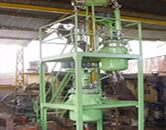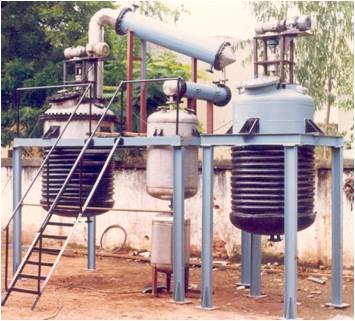Phone Number
+91-9879091953

We offer our customers a wide array of unsaturated Polyester Resin Plants for the manufacture of alkyd resins. These are highly durable and have efficient rendition capacity owing to the top-notch stuff and the most advanced technologies employed in their production. These plants are available at a very reasonable price.

Our Unsaturated Polyester Resin Plant is developed and supplied as per our clients' requirements. The basic system consists of a reaction kettle, vertical column, sub-cooler, and horizontally inclined condenser with separator and dilution blender. The batch time is approximately 16 to 20 hours and therefore, suitable mechanical seal arrangement for better results and to prevent any leakage is provided.
Technical Specification
Capacity: 50 L to 50000 L
Our Unsaturated Polyester Resin Plantis developed and supplied as per our clients' requirements. The basic system consists of a reaction kettle, vertical column, sub-cooler, and horizontally inclined condenser with separator and dilution blender. The batch time is approximately 16 to 20 hours and therefore, suitable mechanical seal arrangement for better results and to prevent any leakage is provided.
Technical Specification
Capacity: 50 L to 50000 L
Polyester resins are unsaturated resins formed by the reaction of dibasic organic acids and polyhydric alcohols. Polyester resins are used in sheet moulding compound , bulk moulding compound and the toner of laser printers. Wall panels fabricated from polyester resins reinforced with fiberglass — so-called fiberglass reinforced plastic (FRP) — are typically used in restaurants, kitchens, restrooms and other areas that require washable low-maintenance walls.
Unsaturated polyesters are condensation polymers formed by the reaction of polyols (also known as polyhydric alcohols, organic compounds with multiple alcohol or hydroxy functional groups, with saturated or unsaturated dibasic acids. Typical polyols used are glycols such as ethylene glycol; acids used are phthalic acid and maleic acid. Water, a by-product of esterification reactions, is continuously removed, driving the reaction to completion. The use of unsaturated polyesters and additives such as styrene lowers the viscosity of the resin. The initially liquid resin is converted to a solid by cross-linking chains. This is done by creating free radicals at unsaturated bonds, which propagate in a chain reaction to other unsaturated bonds in adjacent molecules, linking them in the process. The initial free radicals are induced by adding a compound that easily decomposes into free radicals. This compound is usually and incorrectly known as the catalyst Substances used are generally organic peroxides such as benzoyl peroxide or methyl ethyl ketone peroxide.
Polyester resins are thermosetting and, as with other resins, cure exothermically. The use of excessive catalyst can, therefore, cause charring or even ignition during the curing process. Excessive catalyst may also cause the product to fracture or form a rubbery material.
| Design | : | ASME SEC VIII DIV 1 |
| Thickness | : | 3 mm - 50 mm |
| Pressure holding capacity | : | 5 bar - 20 bar. |
| Connections | : | As per the client's requirement. |
| Structure design | : | As per the client's requirement. |
| Equipment supply | : | Reactor, Blender, Pet-column, Condenser , Receiver tank |
| Capacity | : | 500 kg to 25 ton |
| Accessories | : | Pressure Gauge, Safety Valve, Drain valve and all other accessories. |
| Documents | : | Tank will provide with Hydro-test Report, Drawing, Material Test Report, Internal Inspection Report, 1 Year Warranty. |
| Application | : | POLYSTER RESIN-PLANT,ALKYD,UREA-FORMAHYDE,MALAMINE,GP RESIN-PLANT,EPOXY RESIN PLANT |